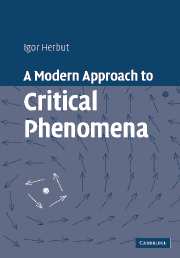Book contents
- Frontmatter
- Contents
- Preface
- 1 Introduction
- 2 Ginzburg–Landau–Wilson theory
- 3 Renormalization group
- 4 Superconducting transition
- 5 Near lower critical dimension
- 6 Kosterlitz–Thouless transition
- 7 Duality in higher dimensions
- 8 Quantum phase transitions
- Appendix A Hubbard–Stratonovich transformation
- Appendix B Linked-cluster theorem
- Appendix C Gauge fixing for long-range order
- Select bibliography
- Index
3 - Renormalization group
Published online by Cambridge University Press: 06 July 2010
- Frontmatter
- Contents
- Preface
- 1 Introduction
- 2 Ginzburg–Landau–Wilson theory
- 3 Renormalization group
- 4 Superconducting transition
- 5 Near lower critical dimension
- 6 Kosterlitz–Thouless transition
- 7 Duality in higher dimensions
- 8 Quantum phase transitions
- Appendix A Hubbard–Stratonovich transformation
- Appendix B Linked-cluster theorem
- Appendix C Gauge fixing for long-range order
- Select bibliography
- Index
Summary
Wilson's momentum-shell transformation with the concomitant expansion around the upper critical dimension is defined. The basic notions of relevant and irrelevant couplings, renormalization flow, and fixed points are introduced. The origins of scaling and of universality are explained, and corrections to mean-field values of critical exponents are computed. The field theoretic renormalization group is briefly discussed and used to calculate the anomalous dimension.
Idea
We found that the direct perturbation theory in the Ginzburg–Landau–Wilson theory breaks down below the upper critical dimension because the perturbation parameter grows with the correlation length, and so becomes arbitrarily large as the critical point is approached. If the system were finite, on the other hand, the correlation length would be bound by its size, and perturbation theory could succeed. Singular thermodynamic behavior near the critical point comes from the thermodynamic limit, or, more precisely, from those modes that have arbitrary low energies in an infinitely large system. This is called the infrared singularity. This observation suggests the following strategy to avoid the problem of direct perturbation theory.
First, note that mass m only provides the energy scale in Eq. (2.36). It is practical to rescale it out by absorbing it into the chemical potential, rede- fined as 2mμ/ħ2 → μ, and into the interaction coupling, as 2mλ/ħ2 → λ. Similarly, near the critical point, the temperature T ≈ Tc may be replaced by the critical temperature, and then eliminated by rescaling the action as 2mκBTcS/ħ2 → S.
Information
- Type
- Chapter
- Information
- A Modern Approach to Critical Phenomena , pp. 43 - 76Publisher: Cambridge University PressPrint publication year: 2007
